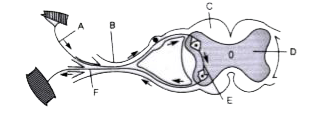Type of neurons with a single process arising from cyton which divides later to form an axon and a long dendron are found in
(a) Olfactory epithelium and cochlea
(b) Grey matter of brain
(c) Sensory dorsal roots of spinal cord in ganglion
(d) Motor ventral roots of spinal cord
Olfactory epithelium and cochlea
Grey matter of brain
Sensory dorsal roots of spinal cord in ganglion
Motor ventral roots of spinal cord
To solve the question regarding the type of neurons with a single process arising from the cyton that later divides into an axon and a long dendron, we can follow these steps:
1. Understanding Neuron Types:
- Neurons can be classified based on their structure. The question refers to neurons with a single process that divides into an axon and a dendron. This description fits unipolar neurons.
2. Identifying Unipolar Neurons:
- Unipolar neurons have one single process that extends from the cell body (cyton), which later branches into two parts: one part becomes the axon and the other part becomes the dendron.
3. Analyzing the Options:
- Option (a): Olfactory epithelium and cochlea - These areas contain bipolar neurons, not unipolar.
- Option (b): Grey matter of the brain - This contains multipolar neurons, not unipolar.
- Option (c): Sensory dorsal roots of spinal cord in ganglion - This is where unipolar neurons are typically found, as they are involved in sensory pathways.
- Option (d): Motor ventral roots of spinal cord - This contains motor neurons, which are typically multipolar.
4. Selecting the Correct Answer:
- From the analysis, the correct answer is (c) Sensory dorsal roots of spinal cord in ganglion, as this is where unipolar neurons are predominantly located.
Final Answer:
The type of neurons with a single process arising from the cyton which divides later to form an axon and a long dendron are found in (c) Sensory dorsal roots of spinal cord in ganglion.
- Neurons can be classified based on their structure. The question refers to neurons with a single process that divides into an axon and a dendron. This description fits unipolar neurons.
- Unipolar neurons have one single process that extends from the cell body (cyton), which later branches into two parts: one part becomes the axon and the other part becomes the dendron.
- Option (a): Olfactory epithelium and cochlea - These areas contain bipolar neurons, not unipolar.
- Option (b): Grey matter of the brain - This contains multipolar neurons, not unipolar.
- Option (c): Sensory dorsal roots of spinal cord in ganglion - This is where unipolar neurons are typically found, as they are involved in sensory pathways.
- Option (d): Motor ventral roots of spinal cord - This contains motor neurons, which are typically multipolar.
- From the analysis, the correct answer is (c) Sensory dorsal roots of spinal cord in ganglion, as this is where unipolar neurons are predominantly located.
The type of neurons with a single process arising from the cyton which divides later to form an axon and a long dendron are found in (c) Sensory dorsal roots of spinal cord in ganglion.
Topper's Solved these Questions
Similar Questions
Which of the following statements are true
(A) The entire process of involuntary response to a peripheral nervous stimulation is called reflex action.
(B)Information regarding changes in the environment is received by the CNS through the sensory organs which are processed and analysed.
(C) Reflex action occurs without conscious effort
(D) Reflex action requires the involvement of a part of the CNS
(E) Signals from sensory organs goes to spinal cord via ventral root. Choose the correct options from given below:-
View SolutionRead the following statements about the human nervous system :
(i) A multipolar neuron is with one axon and two or more dendrites , found in the cerebral cortex.
(ii) in resting condition, the sodium-potassium pump transports 3Na+ inwards and 2K+ outwards the cell.
(iii) Midbrain and hindbrain form the brain stem including the cerebellum.
(iv) the pons of the hindbrain is directly connected to the spinal cord to control respiration.
How many statement/s from above is/are incorrect ?
View SolutionThe diagram given below is a representation of a phenomenon pertaining to the nervous system. Study the diagram and answer the following questions:

(i) Name the phenomenon that is being depicted.
(ii) Give the technical term for the point of contact between the two nerve cells.
(iii) Name the parts A, B, C and D.
(iv) Write the functions of parts E and F.
(v) How does the arrangement of neurons in the spinal cord differ from that of the brain.
View SolutionRead the following statements about phylum Annelida. Identify the true and false statements and select the correct option after referring to the given table .
A. Annelids are diploblastic , metamerically segmented , coelomate animals.
B. Their neural system consists of paired ganglia connected by lateral nerves to a single ventral nerve cord .
C. They process longitudinal and circular muscle fibres which help in locomotion .
D Nephridia help them in osmoregulation and excretion.
View SolutionSelect the correct statement regarding spinal cord.
1) it has butterfly shaped gray matter which is present outside white matter
2) It extends from medulla oblongata upto last coccygeal vertebra
3) Its white matter consists chiefly of long, myelinated nerve fibers
4)Dorsal root ganglia contain cell bodies of motor neurons
View Solution
